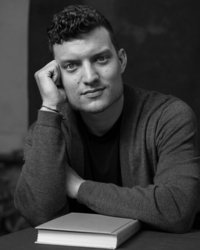Benjamin P. Davis
Goodreads Author
Website
Genre
Influences
Mark Kingwell
Member Since
July 2023
More books by Benjamin P. Davis…
“Weil’s sense of essaying was never limited to writing; it was also about honoring the conversations she had before and after her pen touched the page. She consistently tried to learn from those who had lived the concepts. When she studied oppression, she placed herself amidst Parisian factory workers. When she studied labor, she picked grapes in French vineyards. Through a class analysis, Weil’s actions could be understood as patronizing, being that she came from a wealthy family. But when we also consider that she came from a Jewish family and lived in an anti-Semitic society, and that she was a woman living in a patriarchal society, it is our clear-cut diagnoses and categorizations of her life that become troubled. What we are left with is a philosopher who grappled seriously, rigorously, and intelligently with her responsibilities to others in a context of tremendous brutality. When she is understood that way, Simone Weil becomes our teacher in the present.”
― Simone Weil’s Political Philosophy: Field Notes from the Margins
― Simone Weil’s Political Philosophy: Field Notes from the Margins
“Human rights claims begin conversations that connect struggles and inform practices internationally. Claims documenting state-perpetrated human rights violations at Standing Rock were addressed to, and circulated among, activists in Puerto Rico, Ferguson and Palestine (and vice versa). They crossed territories and called into question states’ claims to sovereignty and legitimacy. They were starting points to share strategies of survival, resistance and imagination. As gateways, organisational human rights claims are part of blueprints for alternative futures, which will always be made in particular and historical sites of contestation.”
― Choose Your Bearing: Édouard Glissant, Human Rights and Decolonial Ethics
― Choose Your Bearing: Édouard Glissant, Human Rights and Decolonial Ethics
“Weil’s sense of essaying was never limited to writing; it was also about honoring the conversations she had before and after her pen touched the page. She consistently tried to learn from those who had lived the concepts. When she studied oppression, she placed herself amidst Parisian factory workers. When she studied labor, she picked grapes in French vineyards. Through a class analysis, Weil’s actions could be understood as patronizing, being that she came from a wealthy family. But when we also consider that she came from a Jewish family and lived in an anti-Semitic society, and that she was a woman living in a patriarchal society, it is our clear-cut diagnoses and categorizations of her life that become troubled. What we are left with is a philosopher who grappled seriously, rigorously, and intelligently with her responsibilities to others in a context of tremendous brutality. When she is understood that way, Simone Weil becomes our teacher in the present.”
― Simone Weil’s Political Philosophy: Field Notes from the Margins
― Simone Weil’s Political Philosophy: Field Notes from the Margins
“Human rights claims begin conversations that connect struggles and inform practices internationally. Claims documenting state-perpetrated human rights violations at Standing Rock were addressed to, and circulated among, activists in Puerto Rico, Ferguson and Palestine (and vice versa). They crossed territories and called into question states’ claims to sovereignty and legitimacy. They were starting points to share strategies of survival, resistance and imagination. As gateways, organisational human rights claims are part of blueprints for alternative futures, which will always be made in particular and historical sites of contestation.”
― Choose Your Bearing: Édouard Glissant, Human Rights and Decolonial Ethics
― Choose Your Bearing: Édouard Glissant, Human Rights and Decolonial Ethics















